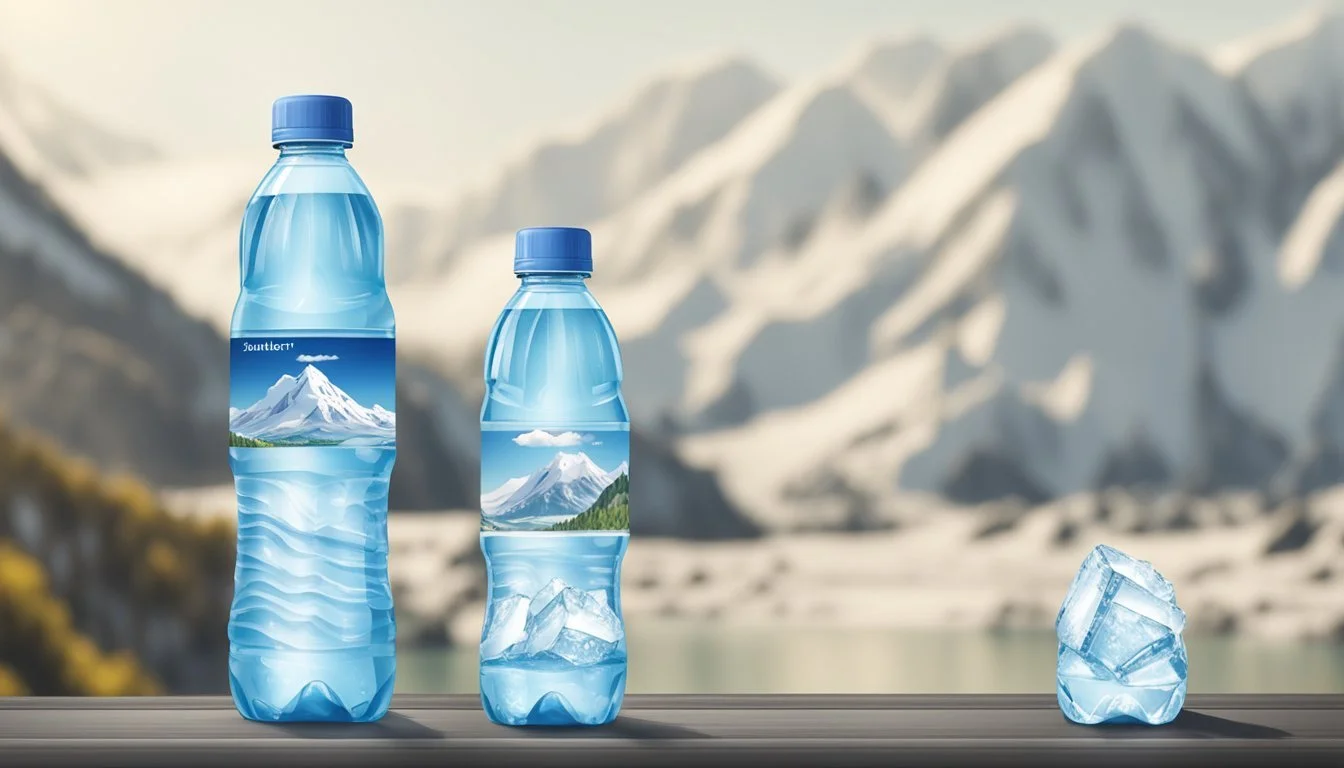Ice Mountain vs. Flow
Comparing Bottled Water Quality
When it comes to bottled water, discerning consumers often find themselves choosing between different brands, each promising purity and refreshment. Among these brands, Ice Mountain and Flow have become popular options. Ice Mountain, known for its multi-step filtration process, guarantees a rigorous approach to delivering clean and crisp water. Flow, on the other hand, prides itself on offering naturally alkaline spring water, which claims to provide several health benefits.
For those seeking a straightforward, no-nonsense bottled water with an emphasis on purity, Ice Mountain stands out with its meticulous filtration methods. Yet, Flow's naturally alkaline water attracts those who prioritize the holistic benefits of drinking water with higher pH levels. Both brands cater to different preferences and needs, making it essential to delve into what each has to offer to determine which is better suited for various lifestyles.
In this post, the attributes of Ice Mountain and Flow will be thoroughly compared, allowing readers to make an informed decision about which bottled water aligns best with their health goals and taste preferences. The evaluation will be critical for making an educated choice in the ever-expanding bottled water market.
Origins and Sources of Ice Mountain and Flow
Understanding the origins and sources of both Ice Mountain and Flow can provide valuable insights into the quality and characteristics of their bottled water offerings.
Ice Mountain Water Source
Ice Mountain sources its water from several natural springs located primarily in Michigan. These springs are part of a carefully managed system ensuring long-term sustainability of the groundwater. The water is naturally filtered through glacial deposits, which is a process that enhances its purity and taste.
Ice Mountain collects from multiple spring locations to maintain a consistent supply. This focus on natural spring water offers a refreshing taste profile that has made the brand popular among consumers in the Midwest and beyond.
Flow Water Source
Flow sources its water from artesian springs in Ontario, Canada. This water is classified as natural spring water and is renowned for its unique mineral content and naturally alkaline pH level. The artesian aquifer provides a pressure that pushes the groundwater to the surface, maintaining its purity by preventing external contamination.
Flow emphasizes eco-friendly packaging and sustainable practices, aligning with the brand's commitment to environmental responsibility. This sourcing and packaging approach resonates with health-conscious consumers looking for premium natural spring water options.
Taste Profile Comparison
The taste of bottled water can be influenced by various factors such as mineral content, filtration methods, and source. This section evaluates the taste profiles of Ice Mountain and Flow.
Ice Mountain Taste Evaluation
Ice Mountain bottled water is often noted for its clean and neutral taste. This can be attributed to its multi-step filtration process which removes large particles and impurities. The water is sourced from natural springs, ensuring a refreshing and pure experience with each sip.
Mineral content plays a crucial role in Ice Mountain's taste. The balance of minerals such as calcium and magnesium provides a subtle yet distinct flavor. Many consumers appreciate the water's crispness, making it a popular choice for those seeking a simple and straightforward hydration option.
Flow Taste Evaluation
Flow is known for its smooth and slightly alkaline taste, boasting a pH level of 8.1. This higher alkalinity not only affects the taste but also provides a different mouthfeel compared to more neutral waters. Flow's water is sourced from artesian springs, which contributes to its unique profile.
The presence of minerals such as calcium, magnesium, and potassium in Flow adds a mild sweetness and enhances the water's overall smoothness. This makes it pleasant and easy to drink. The taste is often described as refreshing and clean, with a balanced mineral composition that sets it apart from conventional bottled waters.
Health and Hydration Benefits
This section examines the health and hydration benefits of Ice Mountain and Flow bottled water. Key factors include nutritional content, mineral composition, and potential health impacts.
Nutritional Content and Hydration
Ice Mountain and Flow offer distinct advantages when considering hydration needs. Ice Mountain water is sourced from natural springs, typically featuring a balanced mineral composition. Flow boasts alkaline water with a pH around 8.1, which some find beneficial for maintaining bodily pH levels.
Electrolytes present in Flow contribute to better hydration and balance of bodily fluids. These electrolytes include calcium, magnesium, and potassium, which are essential for muscle function and overall health. Ice Mountain, being a natural spring water, also contains minerals but in varying amounts.
Both brands provide clean drinking water, free from significant contaminants like PFAS chemicals and microplastics, enhancing their safety and appeal for daily hydration.
Potential Health Impacts
The health benefits of drinking water with balanced minerals go beyond hydration. Flow's alkaline composition may aid in reducing acid reflux and neutralizing acidity in the body, supporting digestive health.
Ice Mountain's natural mineral content can support bone health due to the presence of calcium and magnesium. Consuming mineral water regularly can assist in maintaining electrolyte balance, which is crucial for heart and muscle function.
Both brands meet high standards for purity, minimizing exposure to potential contaminants. This attention to safety ensures consumers are drinking water that not only hydrates but also contributes positively to their overall health and well-being.
Packaging and Environmental Considerations
When evaluating Ice Mountain and Flow, it's crucial to examine their packaging materials and recycling capabilities to determine their environmental impact.
Materials and Design
Ice Mountain utilizes plastic bottles made from petrochemicals derived from oil. These bottles are designed to be lightweight and convenient for transportation and use.
Flow opts for boxed water packaging, using paper cartons that are more sustainable. The cartons are sourced from renewable materials and feature a design aimed at reducing environmental impact.
Recycling and Waste Management
Ice Mountain bottles are widely recyclable. However, the recycling rate for plastic bottles remains low, contributing to waste challenges.
Flow cartons require specialized recycling facilities. In communities with proper systems, these cartons can be effectively recycled. This makes Flow’s packaging potentially more eco-friendly, provided the infrastructure supports it. The preference for paper over plastic aligns with sustainability goals, reducing reliance on fossil fuels and decreasing overall waste.
Purification and Filtration Processes
Both Ice Mountain and Flow use rigorous filtration and purification techniques to ensure the quality and safety of their bottled water products, adhering to industry standards and regulations.
Techniques and Efficiency
Ice Mountain employs a multi-step filtration process which includes micron filtration and UV light treatment to maintain the natural mineral composition of its spring water. Micron filtration removes large particles, while UV light effectively kills bacteria and other pathogens without adding any chemicals.
Flow, on the other hand, utilizes a reverse osmosis process which involves forcing the water through a semi-permeable membrane to remove impurities. This method is known for its efficiency in eliminating contaminants such as lead and chlorine. In addition, Flow’s water goes through an organic ion-exchange process that helps maintain its alkaline nature and adds minerals beneficial for health.
Both brands emphasize keeping their product as pure as possible, though the techniques differ. Ice Mountain relies heavily on preserving natural minerals, while Flow focuses on thorough purification through advanced technology.
Quality and Safety Regulations
Ice Mountain and Flow are both committed to meeting FDA and EPA regulations that monitor bottled water safety and quality. Regular quality reports are conducted and made available to consumers to ensure transparency.
Ice Mountain follows strict guidelines to ensure no contaminants persist in its water before bottling. This includes frequent testing for harmful substances and maintaining compliance with federal standards.
Flow also adheres to similar rigorous testing processes. The brand's reverse osmosis method ensures that the water is exceptionally pure, matching and often exceeding federal safety standards. Additionally, Flow’s sustainable packaging aligns with eco-friendly practices, meeting global safety standards without compromising water quality.
Both brands demonstrate a strong commitment to delivering safe, quality water while adhering to stringent regulatory frameworks.
Cost and Accessibility
When comparing Ice Mountain and Flow, it's important to consider both the cost of each brand and the ease with which consumers can access them. These factors greatly influence consumers' choices, balancing budget constraints with convenience.
Price Range and Market Comparison
Ice Mountain is known for being a budget-friendly option, often priced competitively against brands like Pure Life and Aquafina. It's affordable, making it a popular choice for those who consume bottled water regularly.
On the other hand, Flow is typically positioned as a premium choice, akin to Fiji or Core Hydration. This often results in a higher price point, reflecting its focus on sustainability and eco-friendly packaging. Consumers looking for a cost-effective option might lean towards Ice Mountain, while those prioritizing premium quality and sustainability might prefer Flow.
Availability and Convenience
Ice Mountain is widely available across the United States, with a particularly strong presence in the Midwest. You can find it in major grocery stores, convenience stores, and big-box retailers, making it an easily accessible option for most consumers.
Flow, while also available nationwide, might not be as ubiquitous. Its availability can vary by region and retail outlet, often found in specialty stores and health-focused markets. This may pose a slight inconvenience for those outside major urban centers or without access to these specific stores. However, both brands are easy to purchase online.
In conclusion, Ice Mountain offers broad accessibility and budget-friendly pricing, while Flow appeals to consumers willing to pay a premium for sustainable packaging and quality.
Brand Analysis and Public Perception
Ice Mountain and Flow are prominent players in the bottled water market, each with unique marketing strategies and distinct customer feedback.
Market Presence and Advertising
Ice Mountain benefits from its strong regional market presence, particularly in the Midwest United States. The brand's familiarity and accessibility have bolstered its popularity. It employs traditional advertising channels, emphasizing the purity of its natural spring water, which appeals to health-conscious consumers.
Flow, while newer, leverages a modern, eco-friendly image. It uses sustainable packaging and partners with environmentally conscious celebrities. This approach resonates with younger demographics who prioritize sustainability. Flow's advertising often highlights its alkaline water and mineral content, presenting itself as a premium option for the health-focused market segment.
Customer Reviews and Reputation
Customer reviews for Ice Mountain are mixed but generally positive. Consumers value its taste and affordability. However, environmental concerns about its plastic bottles have been raised. Consumer Reports often lists Ice Mountain as a reliable choice, but it faces criticism for its environmental impact.
Flow, on the other hand, garners praise for its eco-friendly cartons and high-quality water. Reviews commend its clean, crisp taste and sustainable packaging. Despite its higher price point, Flow is perceived as a premium, responsible choice, attracting positive press and strong celebrity endorsements.
Summary
Ice Mountain focuses on affordability and widespread availability. Flow appeals through sustainability and quality. Both brands have their strengths but serve different consumer priorities.
Summary and Recommendations
Both Ice Mountain and Flow offer unique benefits in terms of water quality, convenience, health, and environmental friendliness. The following sections provide specific insights into each brand, helping readers make well-informed decisions.
Final Thoughts on Ice Mountain
Ice Mountain prides itself on its multi-step filtration process, which ensures the removal of large particles and impurities. This results in high water quality that appeals to many consumers seeking a clean and refreshing taste.
In terms of convenience, Ice Mountain is widely available across the United States, particularly in the Midwest. Its recognizable branding and widespread distribution make it easily accessible for consumers.
Health considerations are closely tied to Ice Mountain’s commitment to purity. The brand avoids artificial additives and relies on natural spring sources, which bolsters consumer confidence in its health benefits.
From an environmental perspective, Ice Mountain employs sustainable practices, including using recycled materials for their bottles. However, like many bottled waters, it still contributes to plastic waste.
Final Thoughts on Flow
Flow offers an alkaline water option, boasting a higher pH level, which some consumers find beneficial for digestion and balancing body acidity. This positions Flow as a strong candidate for those seeking functional health benefits in their water.
Convenience is also a key factor for Flow. It is packaged in tetra packs, which are lightweight and easier to transport compared to traditional plastic bottles. These packs are designed to keep the water fresh for longer periods, which can be a significant advantage for those on the go.
Flow markets itself as an environmentally friendly option, using renewable materials for their packaging. This appeals to eco-conscious consumers who prioritize sustainable choices.
The water quality of Flow is maintained through strict quality control measures. The brand emphasizes its source from naturally alkaline springs, adding to the allure of its health-oriented messaging.
More About Ice Mountain
Core Hydration vs Ice Mountain: Which Bottled Water is Better?
Ice Mountain vs Aqua Carpatica: Which Bottled Water is Better?
Ice Mountain vs Cascade Mountain: Which Bottled Water is Better?
Ice Mountain vs Crystal Geyser: Which Bottled Water is Better?
Ice Mountain vs Crystal Lake: Which Bottled Water is Better?
Ice Mountain vs Essence pH10: Which Bottled Water is Better?
Ice Mountain vs Hawaii Volcanic: Which Bottled Water is Better?
Ice Mountain vs Hawaiian Springs: Which Bottled Water is Better?
Ice Mountain vs Icelandic Glacial: Which Bottled Water is Better?
Ice Mountain vs Kirkland Signature: Which Bottled Water is Better?
Ice Mountain vs Liquid Death: Which Bottled Water is Better?
Ice Mountain vs Mountain Valley Spring Water: Which Bottled Water is Better?
Ice Mountain vs Nestle Pure Life: Which Bottled Water is Better?
Ice Mountain vs Poland Spring: Which Bottled Water is Better?
Ice Mountain vs Proud Source: Which Bottled Water is Better?
Ice Mountain vs Purely Sedona: Which Bottled Water is Better?
Ice Mountain vs Richard's Rainwater: Which Bottled Water is Better?
Ice Mountain vs San Pellegrino: Which Bottled Water is Better?
Ice Mountain vs Simple Truth: Which Bottled Water is Better?
Ice Mountain vs Solan de Cabras: Which Bottled Water is Better?
Ice Mountain vs Talking Rain AQA: Which Bottled Water is Better?
Ice Mountain vs Whole Foods 365: Which Bottled Water is Better?
Ice Mountain vs Whole Foods Italian Still Mineral water: Which Bottled Water is Better?







